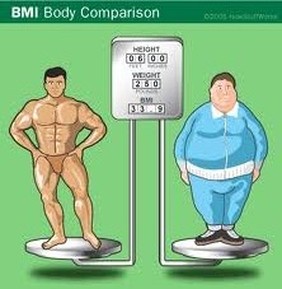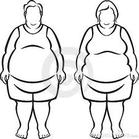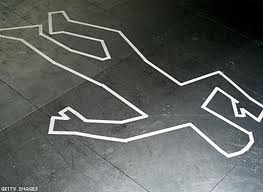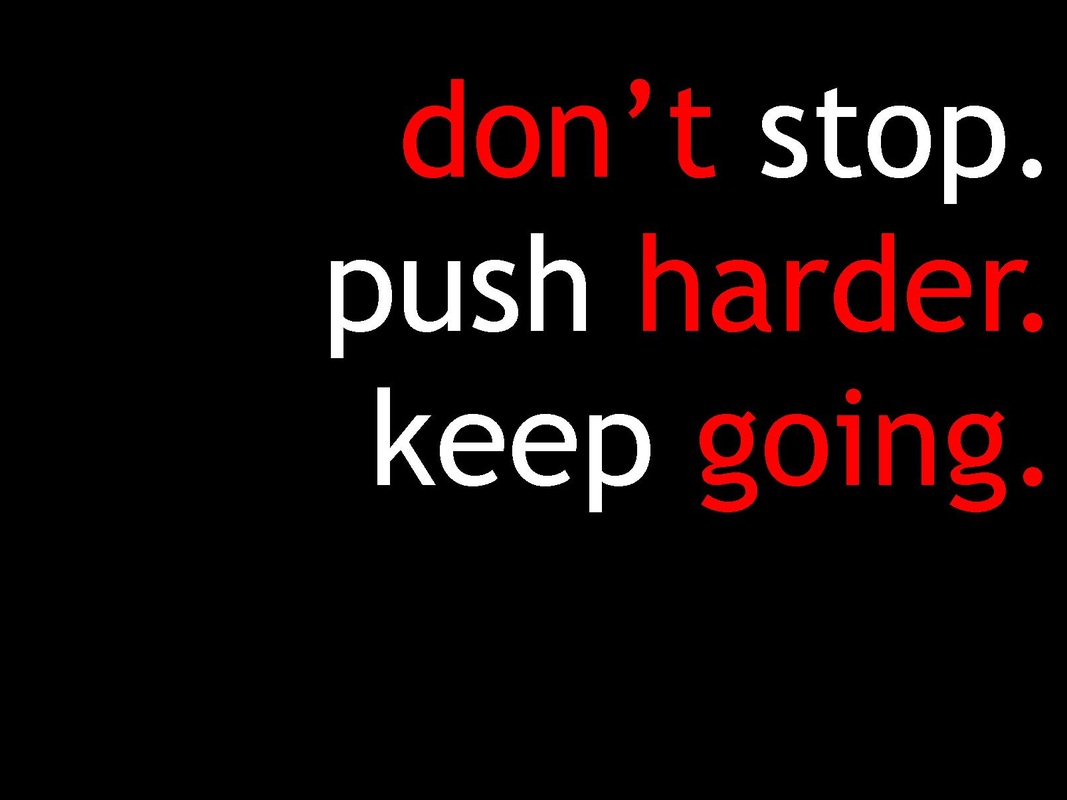Weight and Health
|
People who are overweight or obese tend to have higher blood pressure and higher blood cholesterol levels than others and are more likely to develop heart disease and diabetes or have a stroke.
The smartest way to lose weight and improve your health is to change your eating habits and increase your physical activity. |
|
|
Simple guides for assessing body weight and the amount and distribution of body fat include:
Body Mass Index (BMI) - the ratio of your weight to height Waist Circumference - a measure of abdominal fat Waist to Hip Ratio - (WHR) the ratio of waist circumference to hip circumference OVERWEIGHT People who are overweight have too much body fat. Excess body fat stored around the waist ( apple shaped) is more of a health risk than excess fat around the hips and thighs (pear shaped). If you are overweight, you are more more likely to develop a range of medical conditions including:
|
Most people will put on weight because they eat and drink more calories of food energy than their body needs or uses. This excess energy builds up in the body and is stored as fat. Some medical conditions may also contribute to weight gain. To reach and maintain a healthy weight health authorities recommend "healthy eating" to reduce calorie intake and "regular physical activity" to use up the energy.
Once you have decided to make the change to a healthier lifestyle, start slowly. Do active things that you enjoy and will want to continue. Eat smaller portions, eat slowly and stop eating when you feel full. Eat 5 regular small meals spread out over the day rather than three big meals and try not to eat too late at night. Weight loss should be gradual to ensure you are actually losing fat and not muscle and water. And if it's been a while since you last exercised, check with your doctor first to make sure you are good to go. IMPORTANT
|
Body Mass Index

Body Mass Index (BMI) is used to estimate your total body fat. This helps to determine if your weight is within the normal range , or if you are overweight or under weight. It is calculated by dividing your weight in kilograms by your height in metres squared (m2). Differences in BMI between people of the same age and sex are usually due to body fat. However there are exceptions to this rule, which means a BMI figure may not always be accurate.
Two individuals each 6ft tall and weighing 250 lbs will have a BMI of 33.9. This would classify them as obese. Yet when you look at the picture to the left you can see how this does not accurately reflect the two
BMI calculations will overestimate the body fat for:
*Body Builders
*Some high performance athletes
*Pregnant women
BMI calculations will underestimate the body fat for:
* The elderly
* People with a physical disabilitywho are unable to walk and may have muscle wastage
BMI is also not an accurate indicator for people with an eating disorder or those who are extremely obese. It is not the best measure of an individual's weight / heatlh risk. Waist circumference is a better predictor of risk than BMI.
Healthy weight loss and exercise
Weight loss or Fat loss?
When we talk about losing weight, we really mean losing fat. Weight loss can be muscle, water (fluid), or fat. Standing on the scales gives you no clue as to your body composition - so don't weigh yourself too much - it can really play mind games. Our weight is always fluctuating (often due to hydration levels). The mirror, clothes-fitting, old photos, etc -- can all provide feedback on our fat loss -- not just the scales.
How do you lose fat?
It's a simple law of energy intake and expenditure. Eating more than you are using means you gain weight. Burning more than your eating means you lose weight... Unfortunately the real outworking of this is not so simple. Losing fat (for most people) is hard -- get used to the idea now then you won't struggle so much with disappointment or slow results.
There are 5 principles to keep in mind - Diet (Nutrition), Cardio (Exercise), Dedication (Consistency), Goals, Weight training.
It is possible to lose fat with correct diet alone (for some people) - but the best chance of success will be to apply all these principles. Even the perfect diet plan can fail if you can’t stick to it.
What's weight training got to do with fat loss?
Weight (or strength) training is not essential to lose fat - but it sure helps. A weight training workout boosts metabolism for the whole day and helps build lean muscle. Muscle is metabolically active - it needs fuel - and therefore helps you burn more calories all the time. If you are thinking about weight training - think on this:
Do I want my body to be strong and useful? Or is my body only for people to look at?
Lifting weights makes your body strong and useful.
Can't I just eat less and skip meals?
It's naturally what we want to do - but it's not quite right. "I must lose weight so I'm gonna starve myself". This is where things get a bit confusing. Starve the body too much, and it gets the hint and slows down - you'll feel irritable, fatigued, and begin to lose muscle as well as fat. After clawing your way through hunger pangs and dreams of food, the chances are you will binge, or start eating back how you used to. Guess what happens? The weight piles on because your body is still in "slow" mode. Fat loss is all about calorie reduction, but a calorie intake that is too low will cause problems.
Why bother with exercise?
There are few people that have lost fat (and maintained it), without making exercise a part of their life. Cardiovascular fitness has many health benefits - primarily keeping your heart strong. Including some form of exercise as a natural part of your life will give you an even bigger chance of success. Just remember consistency! Cardio exercise could be something like; brisk walking, jogging, cycling, swimming, treadmill, classes with a trainer.
There's so much to learn - Help?
There are hundreds of exercise and weight loss programs out there. Many of them have terrific claims, but remember:
§ There is no one-size-fits-all weight loss or exercise program.
§ There are no magic bullets or miracle instant cures.
§ There is absolutely EVERY chance that you can transform yourself.
§ It is completely possible for you to lose the fat and get healthier.
§ Believe in yourself.
How do I change my habits?
If you can get enough nutritional knowledge and support and a whole lot of motivation and some new ideas, you can begin to sort out your lifestyle changes. Most of us don't have the know-how to go-it-alone -- so it really helps to have someone else who can design, explain, and customize a fat/weight loss exercise program that will work for you.
What's with all the different diets?
There are hundreds of diets. Some diets work for some - others don't. Here are some simple guidelines. Avoid extremes (e.g. very-low-carb or very-low-fat). Learn about carbohydrates, proteins, and fats. Learn about whole foods and learn how to reduce your intake of processed foods. These factors seem to be common across the board.
The reality is - two different people can get two different results from the same program! So often it is best to work out your own requirements than to follow someone else’s.
Where do I start?
It's possible to get started just by taking some of the higher-calorie items (soft drinks etc) out of your diet, and trying to get out for some exercise. However you will find that without some serious commitment and identified goals - you will soon lose interest. There's nothing like results to keep you motivated.
The chances are you will need some serious help, and this is where I can help to get you started and to keep you motivated.
Can it work for me?
Here's the trick - we are all unique; different physical characteristics, different genetics. This is why each of us will have to do slightly different things to get the fat loss going. Be prepared for a long-term commitment, a belief in change, and a new lifestyle. Weight loss will not only help you to feel emotionally and physically better, but it will also save you money, by lowering health and medical costs and weekly food bills will be lower if you are spending less on processed and junk food.
Information supported by the Pharmaceutical Society of Australia Feb 2011





